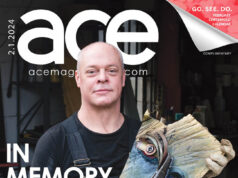BY NATHAN CRYDER
What Lexington needs is new leaders — not just any leaders but a
specific kind of new leader. We need more practical idealists capable of solving our community’s most pressing needs in new and innovative ways. Some call them social entrepreneurs. Others call them social innovators. I simply call them our future.
If there is any upside to the current economic crisis, it is that we have been forced as a nation to take a long, hard look at what got us into this mess. And the only conclusion one can come to is that is was largely caused by our own greed — especially those at the very top rung of the ladder. Those on Wall Street were so caught up in a their own selfabsorbed culture and so disconnected from Main Street that they felt perfectly comfortable consuming massive amounts of artificial wealth without creating anything of actual value. However, as we’ve found out the hard way over the past year, a house of cards can only stand for so long.
As a society, we now need to seriously reassess how we define value. Most people fail to realize that there is absolutely nothing except human psychology and old habits preventing us from placing higher value on companies that behave in a socially responsible manner versus those with the same “objective” metrics that do not do so. A stock’s value correlates directly to simple supply and demand economics determined by investors. And who are these investors?
For the most part, we are! In the U.S., the vast majority of Americans own stocks. Therefore, If we would simply choose to put our money into socially responsible companies, more companies would behave responsibly — if for no other reason than the positive effect it would have on their bottom line. So what does any of this have to do with Lexington?
My dream is that Lexington will soon become a hotbed of social innovation and, equally important,of social investment; that our city will learn to nurture the kinds of leaders needed to thrive in a 21st century more compassionate
form of capitalism; that we will work to become one of the leaders in this area rather than play our usual game of catch-up. In short, that Lexington will actually play a critical role in shaping the new economic landscape our children are likely to encounter.
What evidence do we have that compassionate capitalism is on the horizon? For starters, a man who embodies change and hope has already established a
White House Office for Social Innovation and Social Innovation Fund. As a
result, I and millions of others involved in this budding field are filled with hope that better days lie ahead. We are excited about the increasing number of social entrepreneurs using their business acumen to solve social needs in innovate new ways and blurring the lines between the for-profit and nonprofit
worlds. I know what some of you are probably thinking — a rosy outlook on the country is one thing, but to actually think that our little ol’ Lexington could become a hotbed for anything other than horse-breeding and racing is just plain delusional. “That could never happen in Lexington,” is the mantraof the local naysayer that we hear all the time. “The Distillery District will never happen.”
“We’ll never get an interconnected set of walking and biking trails or have a thriving local food economy.” When I hear such statements, I’m usually compelled to conceal my true feelings. The response I would like to give would go something like this: “Have you absolutely no sense of history or eye for optimism? Are you not aware that one man led a mass movement to gain India’s independence from the British empire and one man led the movement to gain civil rights in America for an entire race of people?” On the other hand, if these same naysayers cite Lexington’s lack of leadership as a reason for pessimism, I am forced to agree. Why? Because it is leadership that drives everything else. If there is a worthwhile project in Lexington and public interest is lacking, effective leadership can fix it. If the problem is the bureaucracy, good leaders can even surmount that.
Gandhi and MLK, Jr. didn’t walk onwater, but they did teach us everything we
need to know about how to become a practical idealist, or what we would term as social innovator today.
Great leaders are not born, they are made — first through the right nurturing
and eventually through direct experience. I am not suggesting that some individuals aren’t born with certain innate qualities conducive to leadership. However, I am suggesting that these talents must be recognized and cultivated by others in order for the individuals who possess them to reach their true
potential. Far too few organizations and institutions in Lexington get this. If and when we finally do, Lexingtonians will stop saying, “That could never happen in Lexington” and begin saying instead “I’m ready to make that happen in Lexington. Now who’s ready to follow?” ■
Nathan Cryder is the Co-founder and Executive Director of Global Gain Social Investments, Inc, a social-profit organization based in Lexington. Globa Gain will be launching Lexington’s first social business incubator in the fall.
“What Lexington Needs” is an open forum for Ace readers. Submit 800 words to editor@ aceweekly.com.







